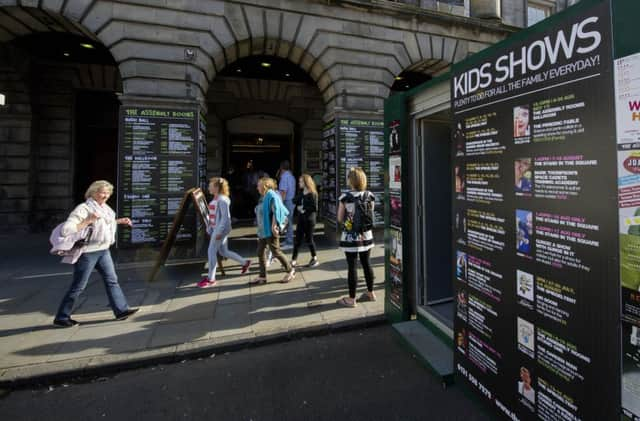Leaders: Tourist tax for festival could be dangerous


But while the festival is a vital contributor not only to business coffers but also to the status and appeal of Edinburgh as a great city in which to live and work, there is a darker backcloth. Edinburgh city council, which provides some £4 million for festival activities, is under fierce financial pressure. It has to make cuts totalling £120 million over the next few years. Its arts budget cannot be expected to remain immune.
This, predictably, has given rise to the idea of a tourist tax. Richard Lewis, the councillor in charge of cultural events, says a new tax will have to be introduced to maintain funding. The council, he reveals, is working “aggressively” on a plan that would see income generated in the city during August ring-fenced for events and venue infrastructure.
Advertisement
Hide AdAdvertisement
Hide AdThe difficulties here are obvious – and immediate. Proposals for a tourism tax have been vigorously resisted by the city’s hoteliers and restaurateurs. They have also had a cold reception from the SNP administration.
Few doubt the difficulties the council faces with its budget. But these are in some part of its own making. It went ahead with the highly expensive tram project, the debt legacy of which requires interest payments stretching years ahead. The reality cannot be avoided that the council needs to order its priorities and to live within fiscal disciplines that come with this.
Any tourist or event tax proposal would have to keep some key considerations in mind. It is certainly true that a number of European countries or cities have introduced a tourist tax – a seductive-looking example. In Germany, Austria, Switzerland, the Netherlands and Greece, it is usually incorporated into the overall accommodation price and visitors often to do not realise this levy is in their bill: a stealth tax in all but name.
The problem with these comparisons is that they overlook a critical difference: the UK’s VAT rate for the hospitality and tourism sector has remained one of the highest in Europe. Despite persistent lobbying, the UK government has declined to reduce the rate for accommodation and visitor attractions. And without a reduction here, the imposition of a tourist tax or levy on ticket events would be regarded as a penal addition on top of an already high VAT rate.
Any tourist tax proposal would also need to consider the consequences and its potential behavioural effects. Would the tax be levied all the year round, adding to business costs, or limited to the month of August? Edinburgh may be handing the Manchester festival a competitive advantage.
Don’t blame the pensioners
In recent years it has been fashionable to blame the now-retired post-war baby boomers for the inter-generational wealth inequality. But the notion that retirees are hoarding wealth in retirement is wrong. And cutting pensioner benefits will not fix the wealth gap.
So says a TUC report into wealth inequality. The points it makes provide a valuable contribution to the debate - as well as bringing some relief to many millions of pensioners who do not feel at all well off or privileged.
The TUC has drawn on an analysis of the UK Wealth and Assets Survey by researchers at the University of Bristol. Among the findings are that people of working age are those most likely to be wealthy, with two thirds of the richest 10 per cent of households aged between 45 and 64. Only about a quarter of such households are aged 65 or above.
Advertisement
Hide AdAdvertisement
Hide AdAnd although rising house prices have “seen some older households accumulate as much wealth during retirement as during their working lives”, there is “substantial inequality” among pensioners, with only 5 per cent paying higher-rate income tax, it adds.
There has also been a widespread call to abolish or curtail winter fuel payments. As this is a universal benefit, available to all pensions regardless of their circumstances, this was seen as a relatively painless way, not only to reduce public spending but also to reduce this perceived generational inequality. But if these were cut, the £2.1 billion which the DWP would recoup would result in extra public spending of only £181 each for 16- to 30-year-olds. “Cuts in support for older people will eventually become cuts in support for today’s young workers,” it adds.
This is a sensible contribution to the current inequality debate and moves it away from what would prove poorly researched – and painful – punitive action against today’s pensioners.